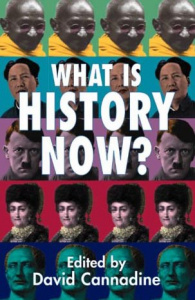What is History Now?
 By David Cannadine
By David Cannadine
Review by Ffion (History)
What is History Now? is a pithy and captivating analysis of the various ways in which historians view the past. The book tackles the more modern concepts of History, with chapters addressing a multitude of different perspectives, including gender, religion and culture – for any budding historians looking to dip their toes into the pools of the various kinds of history available, this is the book for you!
Prior to reading this book, I wasn’t aware of the variety of ways in which the past could be interpreted. Looking back, it was one of the most critical works that prepared me well for beginning my degree, particularly now that I’m studying a paper called “Approaches to History”, which centres around the incorporation of various disciplines in the study of History. Furthermore, the chapter on gender, culture and social History have proved incredibly useful as it provided me with a base understanding of approaches I would later go on to study for modules.
Reading What is History Now gives you the opportunity not only to gather a basic understanding of the ways in which history is viewed and documented, as well as key insight into the more academic nature of history, but it also allows you to see what areas or kinds of perspectives of History interest you individually. For me, it was the chapters on gender and cultural history that I found most fascinating.
In addition to its academic helpfulness, the book takes what could be very complicated and boring analyses of the perspectives of history and makes them engaging and easy to follow. One of the things I found most enjoyable about What is History Now? was the fact that each chapter is written by a different author, and most crucially, by an expert in that field of study, thus ensuring that the discussion of each topic remains engaging, because of the variety of writing styles and techniques, and of the highest and most informative quality. The sheer variety of perspectives, opinions and analysis found in this book makes it both a stimulating and helpful academic work that helps people to establish the basics of a variety of topics, as well as being a fun and enjoyable read that is easy to comprehend.
It is for those reasons, that I would recommend What is History Now? to anybody seeking to study History or any History and joint schools’ subjects here at Oxford!
Review by Rufus (Ancient and Modern History)
At its core, What Is History Now? is a book that documents the new types of historiography that have emerged in the study of history in recent years. The book’s title to a reference to a seminal work of the author’s grandfather, E.H. Carr, What is History? Helen Carr both acknowledges the importance of her grandfather’s work but also makes the case that new historiography needs to write about the huge technological and societal changes that have occurred since the 1960s. We are simply not living in the same world that E.H. Carr did. The book is comprised of a series of short essays written by a number of prominent historians. The intended impact of these essays as a whole is to delve into the new disciplines within the field of history, such as the history of emotions which Helen Carr writes about, but also to see the disciplines of the past in a new, not always positive, light.
As well as being useful in light of my university work, I found that many of the essays within the book were just fascinating (not to mention funny). It was not a book I felt obliged to read by virtue of its place within the reading list but one I can say I would have chosen in Waterstones were I looking for a new read. The book helped me to see how history is portrayed both within and outside academic contexts; the critical lens the book encourages applied to the film as much as it did literature. My favourite essay was one of the first, which touched on representations of history within media (any fans of The Crown will be particularly tickled).
What is History Now? by David Cannadine
ISBN-10: 1403933367
ISBN-13: 9781403933362
Try checking the availability of this book at your school or local library or explore second hand bookshops and websites. You may also wish to purchase from either Amazon or Blackwell’s.
